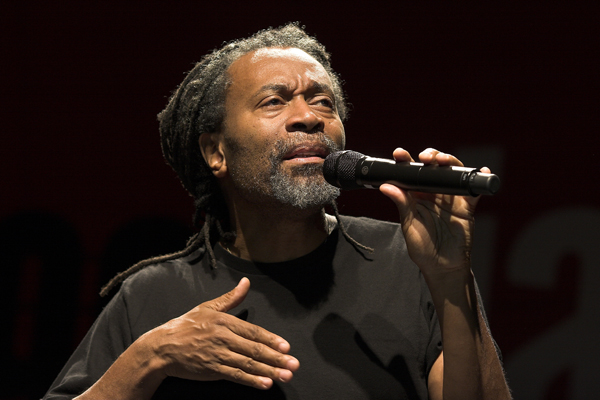
Bobby McFerrin
Robert Keith McFerrin Jr. (born March 11, 1950)[1] is an American jazz singer, songwriter, and conductor. He is known for his vocal techniques, such as singing fluidly but with quick and considerable jumps in pitch—for example, sustaining a melody while also rapidly alternating with arpeggios and harmonies—as well as scat singing, polyphonic overtone singing, and improvisational vocal percussion. He is widely known for performing and recording regularly as an unaccompanied solo vocal artist. He has frequently collaborated with other artists from both the jazz and classical scenes.[2]
For the album, see Bobby McFerrin (album).
Bobby McFerrin
Robert Keith McFerrin Jr.
March 11, 1950
New York City, U.S.
- Singer-songwriter
- conductor
- arranger
- record producer
Vocals, piano, percussion, vocal percussion
1970–present
McFerrin's song "Don't Worry, Be Happy" was a No. 1 U.S. pop hit in 1988 and won Song of the Year and Record of the Year honors at the 1989 Grammy Awards. McFerrin has also worked in collaboration with renowned jazz fusion instrumentalists, including the pianists Chick Corea (of Return to Forever), Herbie Hancock (of The Headhunters), and Joe Zawinul (of Weather Report), the drummer Tony Williams, and the cellist Yo-Yo Ma.[2]
Early life and education[edit]
McFerrin was born in Manhattan, New York City in 1950, the son of operatic baritone Robert McFerrin and singer Sara Copper. He attended Cathedral High School in Los Angeles,[3] Cerritos College,[4] University of Illinois Springfield (then known as Sangamon State University)[5] and California State University, Sacramento.[3]
His mother Sara (Copper) McFerrin was a soloist and taught voice at Fullerton College in Southern California.[6]
Personal life[edit]
He is the son of Robert Keith McFerrin, Sr.; who was the first Black man to sing at America’s flagship opera company – the Metropolitan Opera. He is the father of musicians Taylor McFerrin and Madison McFerrin, and actor Jevon McFerrin.[17][18]
Vocal technique[edit]
As a vocalist, McFerrin often switches rapidly between modal and falsetto registers to create polyphonic effects, performing both the main melody and the accompanying parts of songs. He makes use of percussive effects created both with his mouth and by tapping on his chest. McFerrin is also capable of multiphonic singing.[19]
A document of McFerrin's approach to singing is his 1984 album The Voice, the first solo vocal jazz album recorded with no accompaniment or overdubbing.[20]